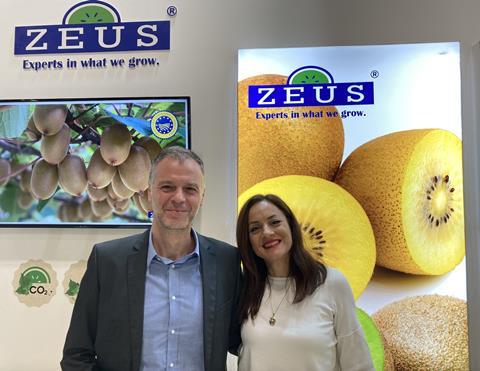Given the growing impact of the climate in the Mediterranean, Greek kiwifruit and grape producer Zeus’s continued focus on improving its environmental performance is not hard to grasp
With the kiwifruit harvest already underway in the Northern Hemisphere, forecasts suggest we’re in for another season of demand outstripping supply, according to Antonis Ioannidis of Greek producer Zeus.
Both Greece and Italy are coming on to the market with a slight increase in volume after relatively small crops last campaign, he said, with Italy expecting production to rise by 6 per cent and Greece by 8 per cent compared with 2023.

“Sizes have shifted toward smaller fruits because of the weather conditions,” revealed Ioannidis, a result of the extreme heat stressing the trees. “The question remains if this will affect the storage ability and condition of the fruit. It’s too early to tell.”
While smaller calibres are welcome after last season’s predominantly larger sizes, storage condition issues would impact sendings to distant markets like East Asia, a journey already lengthened by the ongoing Red Sea crisis.
“The transit time is making the East Asian market less attractive,” said Ioannidis. “Kiwifruit keeps quite well over long journeys, but 40-50 days may prove risky.”
Despite such challenges, growers’ expectations remain high when it comes to prices, he said. “The average yield per hectare is significantly lower, so they expect to have more money per kilo to compensate them for lower yields,” he explained. “So commercially, it is going to be a challenging season for the market once again. However, I don’t expect the opening prices to be any lower than the closing prices of the previous season.”
Zeus’s sustainability credentials are well known when it comes to its kiwifruit, and the same philosophy is at work when it comes to grape production.
“We were the first ones to publish our environmental product declaration (EPD) for our CO2 emissions related to kiwifruit,” said Ioannidis. “We renewed that in 2022 after implementing a number of measures to lower the impact from field inputs - fertiliser and pesticide management, growing practices, the installation of solar panels at the packhouse. That same year, we did our EPD for grapes.”
The company is also close to reaching its target of zero waste going to landfill. “Around 97.6 per cent of our waste goes through channels that produce energy and feed livestock, are recycled or turned into renewable resources,” said Ioannidis. “That shows the spirit of Zeus and how passionate we are about the sustainability of our business, not only in terms of what we’re doing in-house, but also in terms of how we produce.”



